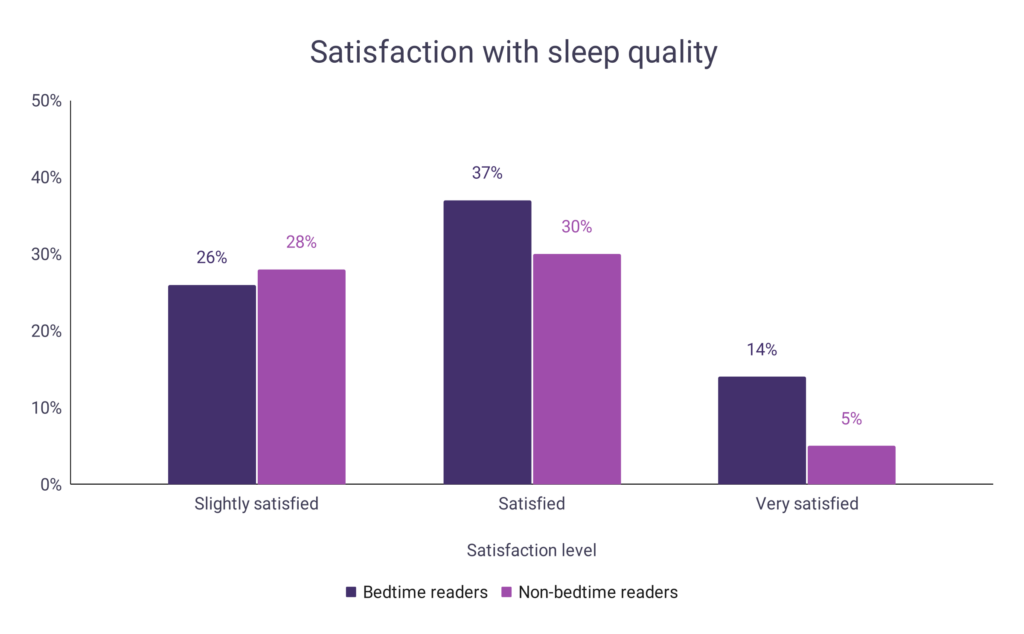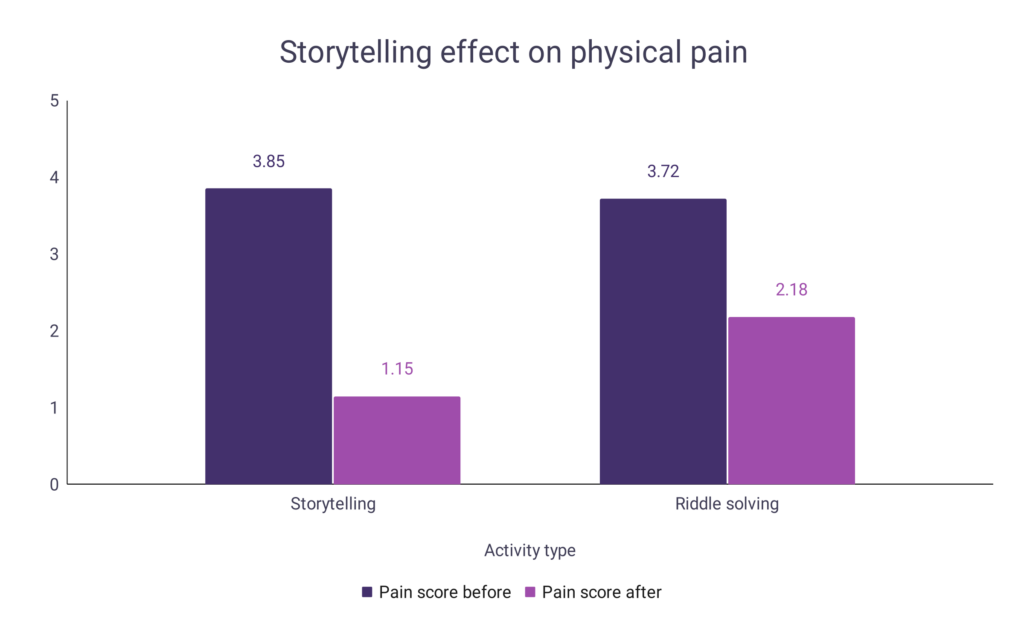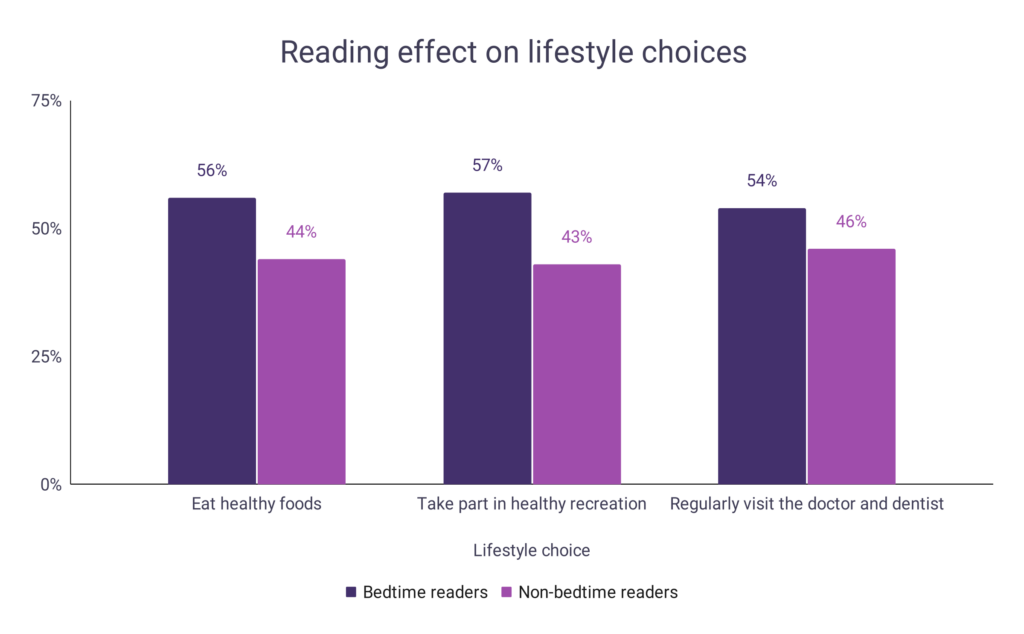As reading is a relaxing activity that also provides cognitive stimulation, there are a significant number of physical and mental health benefits that come from its practice.
- A reduction in mortality of 20% has been observed in book readers (reading books 3.92 hours per week on average) when compared with non-book readers (reading periodicals 6.10 hours per week on average).
- Reading for as little as 6 minutes can reduce stress by 68%.
- Lifelong reading has been shown to slow the rate of mental decline by a third.
- The National Institute on Aging recommends reading to lower the risks of cognitive decline related to Alzheimer’s or dementia.
- 23% of readers believe books help them feel better about their personal situations as they help them realize that others have gone through similar circumstances.
- 19% of readers say spending time with a book makes them feel less lonely.
- People who describe themselves as readers are 10% more likely to have higher levels of self-esteem than those that self-describe as nonreaders.
- Storytelling has been shown to decrease pain in hospitalized children.
- Bedtime readers show greater levels of satisfaction with their sleep quality and quantity when compared to non-bedtime readers.
- They have also been shown to make healthier lifestyle choices when compared against non-bedtime readers.
Benefits of reading on stress
Reading is an effective method of stress-relief that can soothe the mind and alleviate the pressures of daily life, even from just a few minutes of practice.
- Reading for as little as 6 minutes was shown to reduce stress by 68%*.
- 30 minutes of reading can even be as effective as yoga for stress relief.
- Reading can lower the heart rate, blood pressure and ease muscle tension.
- Furthermore, readers can become better informed about their stress levels by choosing to read books that contain information on the topic itself.
*Comparatively, listening to music was shown to reduce stress by 61%, having tea/coffee reduced stress by 54%, taking a walk reduced stress by 42% and playing video games reduced stress by 21%.
Benefits of reading on brain
Across all age groups, reading can provide a whole host of health advantages that can benefit the reader or listener’s cognitive ability.
- Humans are not predisposed to translate letters into sounds and as such, reading uses the brain areas designed for visual processing, language comprehension and speech production.
- With each page read, the brain needs to decipher, analyze and store further information.
- Reading requires mental visualization which stimulates the brain more than other forms of entertainment, such as TV and film.
- Although it is possible to read both actively and passively, reading is typically considered to be an active skill due to these processes.
- As books often take days or weeks to complete, they also exercise the memory and give readers time to consciously or unconsciously speculate on the direction of the plot.
- Reading is more neurobiologically challenging when compared to speaking or listening.
- Due to these factors, reading can be an effective treatment to those who suffer strokes, by forcing the brain to use different synapses (connections between brain neurons).
Benefits of reading on sleep
Sleep quality and quantity can both be positively impacted by reading, leading to improved rest and an increased sense of well-being.
- Reading a print book can encourage a good night’s sleep as it does not emit the lights associated with devices such as phones, tablets, and e-readers.
- The reading of physical book copies can help regulate the body clock, naturally signaling to the brain that it’s time to fall asleep.
- Those who read at bedtime have been found to sleep for an additional 1 hour and 37 minutes per week when compared to those that don’t.
- In addition, 96% of bedtime readers would recommend the habit to other people.
- Readers can also become better informed about their sleeping habits by choosing to read books containing information on the topic itself.
Benefits of bedtime reading
- According to a 2021 survey on bedtime reading, its most commonly reported benefit is relaxation (81%).
- Stress reduction (65%) follows, with reading being used to aid falling asleep and to center the mind being the third most commonly reported benefits (both 63%).
- Bedtime reading to improve overall sleep quality (50%) rounds off the top five most highly reported benefits.
| Benefit | Number of respondents* |
| Relaxation | 81% |
| Stress reduction | 65% |
| Aids with falling asleep | 63% |
| Centers the mind | 63% |
| Improves quality of sleep | 50% |
A graph is given below to show the benefits of bedtime reading:

Reading effect on sleep quality
- According to the survey, bedtime readers show greater levels of satisfaction with their sleep quality when compared to non-bedtime readers.
- Non-bedtime readers were more likely to report being slightly satisfied with their sleep quality when compared to bedtime readers.
- Bedtime readers were more likely to report being satisfied with their sleep quality when compared to non-bedtime readers.
- Bedtime readers were also more likely to report being very satisfied with their sleep quality when compared to non-bedtime readers.
| Satisfaction level | Bedtime readers | Non-bedtime readers |
| Slightly satisfied | 26% | 28% |
| Satisfied | 37% | 30% |
| Very satisfied | 14% | 5% |
A graph is given below to compare sleep quality satisfaction between bedtime readers and non-bedtime readers:

Reading effect on sleep quantity
- According to the survey, bedtime readers show improved levels of satisfaction with their sleep quantity when compared to non-bedtime readers.
- Non-bedtime readers were more likely to report being slightly satisfied with their sleep quantity when compared to bedtime readers.
- Bedtime readers were more likely to report being satisfied with their sleep quantity when compared to non-bedtime readers.
- Bedtime readers were also more likely to report being very satisfied with their sleep quantity when compared to non-bedtime readers.
| Satisfaction level | Bedtime readers | Non-bedtime readers |
| Slightly satisfied | 12% | 13% |
| Satisfied | 19% | 16% |
| Very satisfied | 6% | 3% |
A graph is given below to compare sleep quantity satisfaction between bedtime readers and non-bedtime readers:

Benefits of reading on life expectancy
A positive correlation has been found between regular readers and higher life expectancies, showing the importance of practicing reading as a daily activity.
- A reduction in mortality of up to 20% has been observed in book readers when compared with non-book readers.
- People over 50 who read books were shown to survive approximately 2 years longer on average than those who don’t read books.
- Book reading is linked to a much higher survival advantage when compared to other types of reading, such as newspapers and magazines.
- In addition, frequent readers are more likely to earn higher lifetime earnings, which has also been linked to higher life expectancies.
Health benefits of reading for the elderly
For elderly individuals, reading has been shown to reduce the cognitive effects of aging, due to its ability to encourage the development of neural connections.
- Lifelong reading has been shown to slow the rate of mental decline by a third.
- Seniors who read every day during a study saw their cognitive functions improve over a 6 month period.
- It is commonly believed that reading stimulates the brain to offset negative changes in the brain related to age.
- The National Institute on Aging recommends reading to lower the risks of cognitive decline related to Alzheimer’s or dementia.
- For lifelong readers, the physical ailments found on the brains of people with dementia are less likely to develop.
- Further research has shown that a larger vocabulary (which is boosted by reading) is linked to slower mental decline.
Mental health benefits of reading
A healthy, regular reading habit has been shown to provide numerous positive impacts on an individual’s psychological and emotional well-being.
- 23% of readers believe books help them feel better about their personal situations as they help them realize that others have gone through similar circumstances.
- People who describe themselves as readers are 10% more likely to have higher levels of self-esteem than those that self-describe as nonreaders.
- Reading has even been shown to provide benefits for individuals that suffer from the effects of social isolation.
- 19% of readers say spending time with a book makes them feel less lonely.
- Reading can increase a person’s emotional intelligence and empathy, making them more likely to build meaningful relationships with other people.
- A number of mental health disorders show correlations with reading skill deficits, showing the importance of overall literacy levels.
- Bibliotherapy, the treatment of mental conditions using books as therapy, can reduce depression symptoms in children, adolescents and adults.
- It can also be a viable treatment option for those who are unable or not looking to pursue traditional forms of therapy.
- Self-help books can measurably improve the condition of people with depression and anxiety.
- Readers can become better informed about their mental health by choosing to read books containing information on the topic itself.
Physical health benefits of reading
In addition to mental health benefits, there are also some surprising physical health benefits which can be present in those that read frequently.
- Bedtime readers have been shown to make healthier lifestyle choices than non-bedtime readers, more commonly eating healthy foods, taking part in healthy recreational activities and regularly visiting the doctor and dentist.
- Storytelling has been shown to decrease pain in hospitalized children.
- One study found that obese girls aged 9-13 reduced their BMI after reading a story about an overweight pre-teen who learns to make healthier lifestyle choices.
- This demonstrated the power of characters within books to influence the decision making of the reader, which is beneficial if they exercise healthy habits.
- Although a person’s vision will not improve from reading physical books, it can help promote healthy eye circulation and glare.
- In contrast, reading for lengthy periods, reading in dimly lit rooms or on electronic devices can lead to eye strain and dry eyes.
- Readers can also become better informed about their physical health by choosing to read books containing information on the topic itself.
Storytelling effect on physical pain
- According to a study on pain in hospitalized children, storytelling can reduce pain levels by 70.13%.
- The control group within the study were given a riddle solving activity which was able to reduce pain levels by 41.40%.
- Storytelling was shown to be much more effective at reducing pain when compared against the results of the control group.
- This effect could be due to the ability of stories to fully capture the attention and imagination of the reader/listener, decreasing their awareness of other senses.
| Activity type | Pain score before* | Pain score after* | Change |
| Storytelling | 3.85 | 1.15 | – 70.13% |
| Riddle solving | 3.72 | 2.18 | – 41.40% |
A graph is given below to show the effect of storytelling on physical pain:

Reading effect on lifestyle choices
- According to a survey, bedtime readers are more likely to make healthy lifestyle choices when compared with non-bedtime readers.
- A higher percentage of bedtime readers look to eat healthier foods than non-bedtime readers.
- A higher percentage of bedtime readers take part in healthy recreation than non-bedtime readers.
- A higher percentage of bedtime readers regularly visit the doctor and dentist than non-bedtime readers.
| Lifestyle choice | Bedtime readers | Non-bedtime readers |
| Eat healthy foods | 56% | 44% |
| Take part in healthy recreation | 57% | 43% |
| Regular visits to doctor and dentist | 54% | 46% |
A graph is given below to compare lifestyle choices between bedtime readers and non-bedtime readers:


